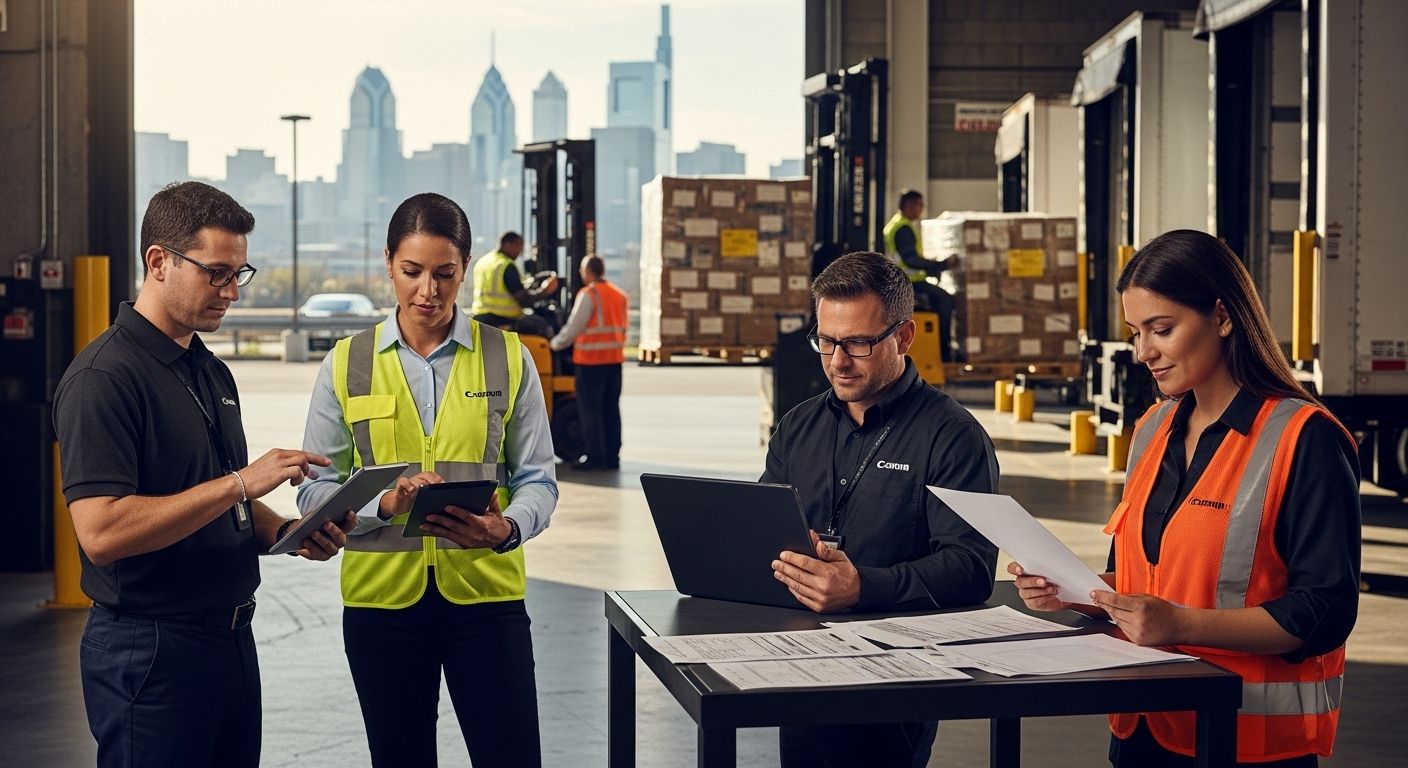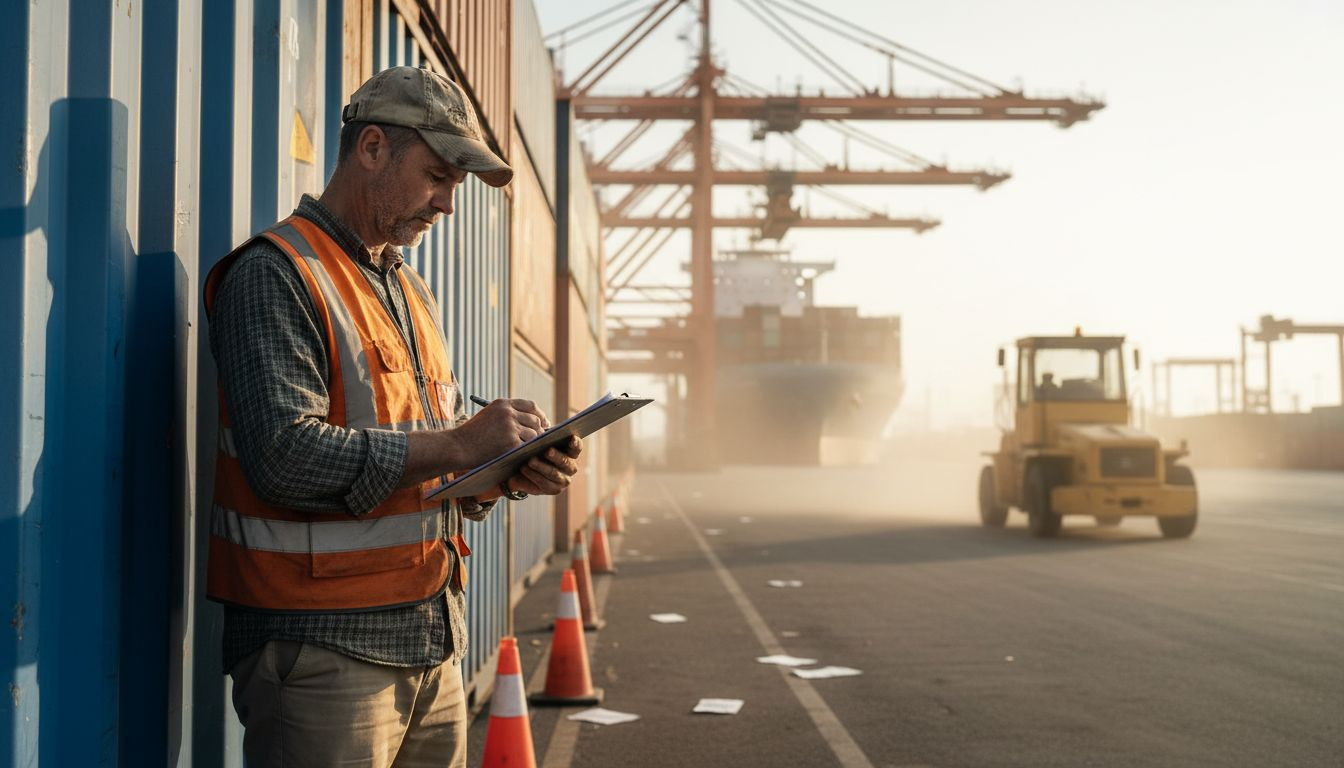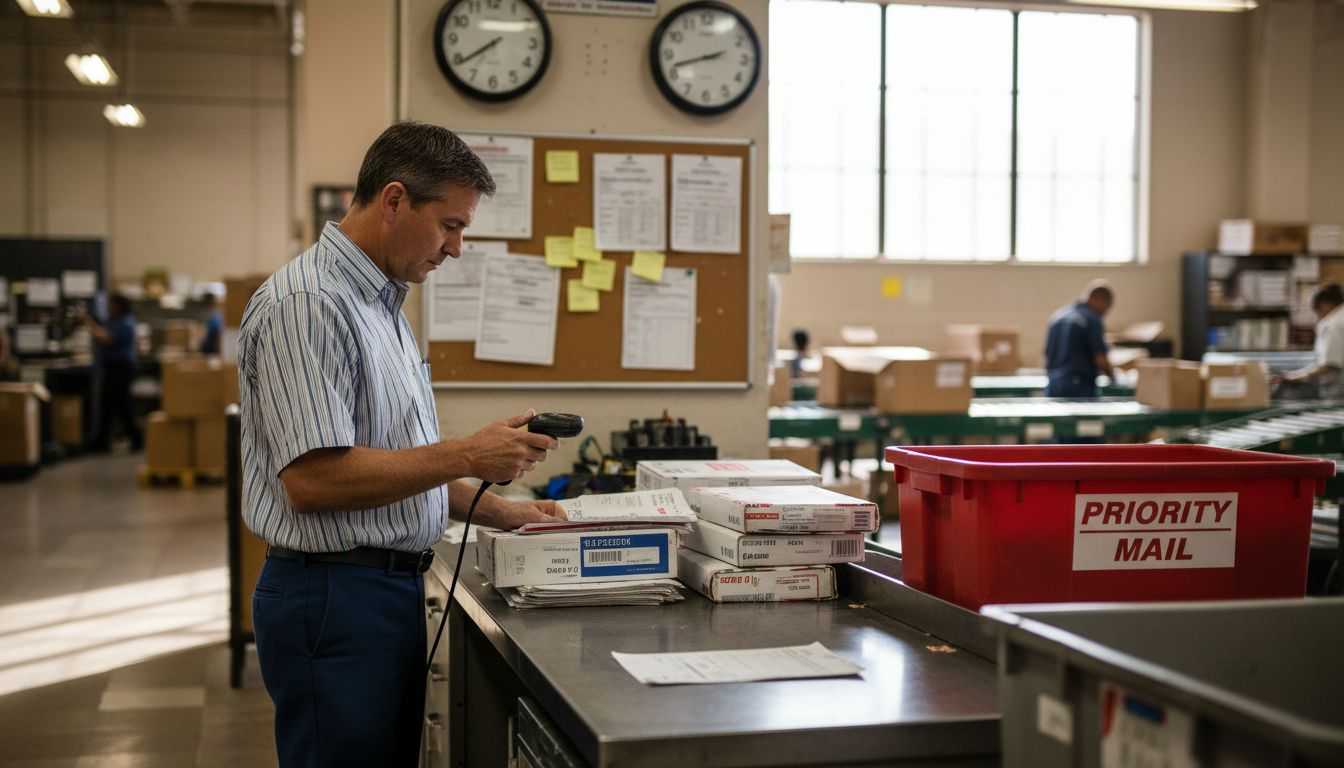Freight forwarding might seem like a behind-the-scenes detail in the world of global trade, but it actually powers the entire journey of goods from Pennsylvania to every corner of the globe. Here’s a shocker. Truck freight alone moves the largest share of goods by both weight and value in the United States. Most people think success is all about picking the lowest-priced shipping partner, yet the real secret lies in understanding which strategies and technologies deliver smooth, cost-effective logistics that keep your business out in front.
Table of Contents
- Understand The Basics Of Freight Forwarding
- Choose The Right Freight Forwarder For Your Needs
- Know The Types Of Freight Services Available
- Familiarize Yourself With Import And Export Regulations
- Implement Effective Shipping Strategies
- Leverage Technology For Tracking And Management
- Optimize Your Supply Chain Processes
- Stay Updated On Industry Trends And Changes
Quick Summary
| Takeaway | Explanation |
|---|---|
| Understand freight forwarding basics | Comprehend the essential logistics functions of freight forwarding to navigate global trade effectively. |
| Choose the right freight forwarder | Select a partner based on experience, technology, and compliance to enhance logistics operations. |
| Know diverse freight service types | Evaluate different transportation modes like air, ocean, and trucking to meet your shipping needs. |
| Familiarize with regulations | Understand import and export regulations to ensure compliance and smooth international shipping operations. |
| Leverage technology for efficiency | Utilize advanced tracking and management technologies to optimize supply chain visibility and decision-making. |
1: Understand the Basics of Freight Forwarding
Freight forwarding represents a complex but critical component of international trade, connecting businesses across global supply chains. At its core, freight forwarding involves coordinating and managing shipments of goods from one location to another, navigating intricate transportation networks and regulatory requirements.
A freight forwarder acts as an intermediary between shippers and various transportation services, handling essential logistics functions. Learn more about freight forwarding roles to comprehend their strategic importance in global commerce.
Key responsibilities of freight forwarders include:
-
Negotiating transportation rates with carriers
-
Preparing documentation for international shipments
-
Tracking cargo movements
-
Arranging customs clearance
-
Providing cargo insurance options
Successful freight forwarding in Pennsylvania demands comprehensive understanding of multiple transportation modes including air, ocean, rail, and trucking. Professionals must possess deep knowledge of international shipping regulations, customs procedures, and documentation requirements.
Freight forwarders also manage complex logistical challenges such as:
-
Route optimization
-
Cost management
-
Compliance with international trade regulations
-
Minimizing shipping risks
According to Global Trade Magazine, the freight forwarding industry continues to transform through technological innovations, requiring professionals to stay updated on emerging digital platforms and tracking systems that enhance shipment visibility and efficiency.
Understanding these fundamental aspects provides a solid foundation for navigating the intricate world of freight forwarding in Pennsylvania’s dynamic logistics landscape.
2: Choose the Right Freight Forwarder for Your Needs
Selecting the appropriate freight forwarder is a critical strategic decision for businesses engaged in international shipping. The right partner can significantly streamline your logistics operations, reduce costs, and minimize potential shipping complications.
Learn about the critical differences between freight forwarders and brokers to make an informed selection process.
When evaluating potential freight forwarders in Pennsylvania, consider these essential criteria:
-
Experience in your specific industry
-
Global network and partnerships
-
Technology and tracking capabilities
-
Compliance and regulatory expertise
-
Transparent pricing structures
Comprehensive industry knowledge is paramount. A freight forwarder with deep understanding of your specific sector can anticipate potential challenges, recommend optimal shipping strategies, and provide tailored logistics solutions.
According to Global Trade Compliance Guidelines, businesses should prioritize forwarders with robust compliance programs that demonstrate:
-
Thorough risk assessment protocols
-
Documented export control procedures
-
Proactive regulatory monitoring
-
Strong documentation management
Additionally, examine the freight forwarder’s technological infrastructure. Modern logistics demand real-time tracking, digital documentation, and seamless communication platforms. Advanced digital capabilities can provide crucial visibility into your supply chain, enabling more precise planning and risk management.
Remember that the cheapest option is not always the most cost-effective. Evaluate potential partners based on their ability to deliver comprehensive, reliable, and efficient shipping solutions that align with your specific business objectives.
3: Know the Types of Freight Services Available
Understanding the diverse landscape of freight services is crucial for businesses seeking efficient transportation solutions. Discover how cargo freight services can transform your shipping strategy and optimize your logistics operations.
Freight transportation encompasses multiple modes, each designed to meet specific shipping requirements. Businesses must carefully evaluate their cargo characteristics, budget, and delivery timelines when selecting an appropriate transportation method.
The primary freight transportation modes include:
-
Truck Freight: Most flexible and widespread transportation method
-
Rail Freight: Cost-effective for bulk and heavy shipments
-
Air Freight: Fastest transportation with highest cost per mile
-
Ocean Freight: Ideal for international and large-volume shipments
-
Intermodal Transportation: Combines multiple transportation modes for optimal efficiency
Air freight offers the quickest delivery times, making it perfect for time-sensitive or high-value goods. However, it comes with higher costs compared to other transportation modes. Ocean freight provides a more economical solution for international shipments, particularly for large volumes of merchandise.
According to U.S. Department of Transportation Freight Analysis, truck transportation remains the dominant freight mode in the United States, moving the largest share of goods by both weight and value.
Key considerations when selecting freight services include:
-
Shipment size and weight
-
Delivery urgency
-
Budget constraints
-
Cargo fragility
-
International shipping requirements
Pennsylvania businesses benefit from understanding these diverse freight service options, enabling them to design logistics strategies that balance speed, cost, and reliability effectively.
4: Familiarize Yourself with Import and Export Regulations
Import and export regulations represent a complex legal landscape that demands meticulous attention from businesses engaged in international trade. Navigating these regulations is crucial for ensuring smooth, compliant shipping operations in Pennsylvania and beyond.
Learn how to master critical export shipping documentation to streamline your international trade processes.
Businesses must understand the critical regulatory requirements governing international shipments:
-
Obtaining proper export licenses
-
Classifying goods according to harmonized tariff codes
-
Calculating accurate customs duties and taxes
-
Maintaining comprehensive shipment documentation
Compliance begins with thorough documentation and understanding specific regulations for different product categories. Each industry and commodity type may have unique export control restrictions, particularly for technology, agricultural products, and specialized equipment.
According to U.S. Census Bureau Trade Regulations, businesses must file Electronic Export Information (EEI) for shipments exceeding specific monetary or weight thresholds. These requirements help government agencies track international trade and ensure national security.
Key compliance considerations include:
-
Understanding Department of Commerce export control regulations
-
Screening transactions against denied party lists
-
Maintaining accurate record-keeping
-
Staying updated on changing international trade policies
Pennsylvania businesses must proactively manage their regulatory compliance, recognizing that violations can result in significant financial penalties and potential legal consequences. Partnering with experienced freight forwarders and customs brokers can help mitigate these risks and ensure smooth international shipping operations.
5: Implement Effective Shipping Strategies
Developing a robust shipping strategy is fundamental to successful freight forwarding in Pennsylvania’s competitive logistics landscape. Businesses must approach shipping with a comprehensive, data-driven methodology that optimizes cost, efficiency, and reliability.
Learn about strategic shipping container selection to enhance your logistics planning.
Effective shipping strategies require careful consideration of multiple interconnected factors:
-
Comprehensive route planning
-
Carrier performance analysis
-
Cost optimization techniques
-
Risk management protocols
Technology plays a critical role in modern shipping strategy. Advanced tracking systems, predictive analytics, and real-time monitoring tools enable businesses to make informed decisions, reduce potential disruptions, and improve overall supply chain visibility.
According to Logistics Performance Research, carriers with focused strategic approaches demonstrate superior operational performance. This underscores the importance of developing tailored shipping strategies that align with specific business requirements.
Key strategic considerations include:
-
Diversifying transportation modes
-
Implementing flexible routing options
-
Leveraging technology for shipment tracking
-
Establishing contingency plans
Businesses in Pennsylvania must continuously evaluate and refine their shipping strategies, recognizing that the logistics landscape is dynamic and demands ongoing adaptation. Proactive planning, technological integration, and a willingness to explore innovative approaches will distinguish successful freight forwarding operations in an increasingly complex global marketplace.
6: Leverage Technology for Tracking and Management
Technology has revolutionized freight forwarding, transforming how businesses manage and track shipments across complex global networks. Modern logistics demand sophisticated digital solutions that provide real-time visibility, enhanced decision-making capabilities, and unprecedented operational transparency.
Explore advanced tracking technologies for freight management to optimize your shipping operations.
Cutting-edge technological tools offer businesses critical advantages in freight management:
-
Real-time shipment tracking
-
Predictive analytics
-
Automated documentation processing
-
Advanced route optimization
Digital platforms enable unprecedented supply chain visibility, allowing businesses to monitor shipments with precision and respond quickly to potential disruptions. GPS tracking, blockchain technology, and integrated management systems have become essential tools for modern freight forwarding operations.
According to Federal Highway Administration Research, emerging technologies like machine-learning algorithms and integrated tracking systems are transforming freight movement data collection and management strategies.
Key technological considerations for Pennsylvania businesses include:
-
Implementing cloud-based logistics platforms
-
Integrating Internet of Things (IoT) sensors
-
Utilizing artificial intelligence for predictive modeling
-
Developing robust cybersecurity protocols
Businesses that successfully integrate advanced technologies into their freight forwarding strategies will gain significant competitive advantages. By leveraging data-driven insights and real-time tracking capabilities, companies can optimize routes, reduce costs, mitigate risks, and deliver superior customer experiences in an increasingly complex global logistics landscape.
7: Optimize Your Supply Chain Processes
Supply chain optimization is the cornerstone of successful freight forwarding in Pennsylvania’s dynamic logistics environment. Businesses must continuously refine their processes to achieve maximum efficiency, reduce costs, and maintain competitive advantage.
Discover strategies for streamlining logistics operations to enhance your supply chain performance.
Effective supply chain optimization requires a multifaceted approach:
-
Comprehensive data analysis
-
Strategic inventory management
-
Continuous process improvement
-
Cross-functional collaboration
Pennsylvania’s strategic geographic location provides unique logistical advantages, positioning businesses to leverage an extensive transportation network that connects major metropolitan areas and international markets. This infrastructure enables more efficient supply chain management and reduced transportation times.
According to U.S. Department of Transportation Research, advanced optimization tools can significantly improve transportation route efficiency and reduce operational costs.
Key optimization strategies include:
-
Implementing lean inventory practices
-
Developing agile response mechanisms
-
Investing in predictive analytics
-
Creating flexible supply chain networks
Successful supply chain optimization demands a holistic approach that integrates technology, strategic planning, and continuous adaptation. Businesses must remain proactive, leveraging data-driven insights and innovative technologies to create resilient, efficient logistics systems that can quickly respond to market changes and emerging challenges.
8: Stay Updated on Industry Trends and Changes
Freight forwarding is an increasingly dynamic industry that demands continuous learning and adaptation. Professionals in Pennsylvania must remain vigilant about emerging technologies, regulatory changes, and global economic shifts that impact logistics operations.
Technological innovations are rapidly transforming the freight forwarding landscape. Automation, artificial intelligence, and advanced tracking systems are revolutionizing how businesses manage shipping and logistics processes.
Key areas professionals should monitor include:
-
Emerging transportation technologies
-
Regulatory policy changes
-
Global economic trends
-
Sustainability initiatives
According to U.S. Occupational Outlook Statistics, the freight forwarding sector is experiencing significant growth, with employment projected to expand by 10% in the coming decade. This growth underscores the importance of staying current with industry developments.
Strategies for staying informed:
-
Attend industry conferences
-
Subscribe to logistics publications
-
Network with industry professionals
-
Participate in continuous professional development
Professionals who cultivate a proactive approach to learning will be best positioned to navigate the complex and rapidly changing freight forwarding environment. By remaining informed about technological advancements, regulatory updates, and emerging best practices, businesses can maintain a competitive edge and adapt quickly to new challenges in the logistics sector.
Below is a comprehensive table summarizing the eight essential tips for freight forwarding success in Pennsylvania, covering key steps, considerations, and benefits discussed in the article.
| Tip / Focus Area | Key Points & Actions | Benefits for Pennsylvania Businesses |
|---|---|---|
| Understand Freight Forwarding Basics | Learn logistics fundamentals, documentation, and modes (air, ocean, rail, trucking) | Navigate global trade smoothly; minimize shipping risks |
| Choose the Right Freight Forwarder | Evaluate experience, technology, compliance, pricing, and industry knowledge | Streamlined operations, reduced costs, and reliable partnerships |
| Know Types of Freight Services | Assess truck, rail, air, ocean, intermodal based on cargo, speed, budget | Tailored logistics for efficiency, cost, and reliability |
| Familiarize with Import/Export Regulations | Comply with documentation, licensing, tariff classification, controls, and stay informed | Avoid legal penalties and ensure smooth international shipping |
| Implement Effective Shipping Strategies | Use data-driven methods: route planning, cost optimization, risk management, contingency plans | Enhanced logistics efficiency, faster delivery, lower costs |
| Leverage Technology for Tracking/Management | Employ real-time tracking, analytics, automation, digital platforms | Increased shipment visibility, faster response, and informed decision-making |
| Optimize Supply Chain Processes | Analyze data, manage inventory, integrate advanced tools, foster collaboration | Greater agility, cost savings, and improved supply chain performance |
| Stay Updated on Industry Trends & Changes | Monitor tech innovations, regulations, global shifts; invest in ongoing learning | Competitive edge, proactive adaptation, and sustained logistics success |
Transform Your Pennsylvania Freight Forwarding with a Trusted Partner
Struggling to keep up with complex logistics, changing regulations, or the pressure to optimize your freight operations in Pennsylvania? You are not alone. Many businesses face confusion over customs compliance, shipment tracking, and selecting the right freight services for their cargo. Delays and unforeseen costs can stall your growth and drain resources, especially when successful freight forwarding demands detailed documentation, risk management, and the latest technology.
Make your next logistics move with confidence by connecting to Worldwide Express, Inc..

The right partner eliminates uncertainty. Worldwide Express, Inc. delivers tailored solutions to every problem highlighted in your journey, from choosing the correct transport mode to mastering compliance and tracking. Make the most of industry experience, global coverage, and end-to-end visibility. Visit our main site and explore our service resources to take control now. Get a quote, request a consultation, or let our experts streamline your freight forwarding in Pennsylvania today.
Frequently Asked Questions
What is the role of a freight forwarder in Pennsylvania?
A freight forwarder acts as an intermediary between shippers and various transportation services, managing the logistics of shipping goods, including negotiating rates, preparing documentation, and arranging customs clearance.
How can I choose the right freight forwarder for my business in Pennsylvania?
When selecting a freight forwarder, consider factors such as their industry experience, global network, technology capabilities, compliance expertise, and transparent pricing structure to ensure they align with your specific shipping needs.
What types of freight services are available for shipping?
The primary freight transportation modes include truck freight, rail freight, air freight, ocean freight, and intermodal transportation, each suited for different types of shipments based on size, urgency, and budget.
Why is understanding import and export regulations important for businesses?
Navigating import and export regulations ensures compliant shipping operations, helping businesses avoid significant financial penalties or legal consequences due to violations, and facilitates smoother international trade processes.






